Corporations Law: Director's Responsibilities and Legal Issues
VerifiedAdded on 2021/06/14
|6
|1197
|54
Homework Assignment
AI Summary
This Corporations Law assignment solution addresses key legal issues concerning director's duties and liabilities. It examines the responsibilities of directors in relation to insolvent trading under Section 588G of the Corporations Act 2001, including personal liability for debts and tax offenses. The assignment also explores the concept of corporate opportunity, and whether a director can take advantage of it for personal gain. The solution further analyzes the penalties that ASIC may seek for breaches of the Corporations Act, including disqualification, pecuniary penalties, and compensation orders. Finally, it covers legal actions against a director for failing to act in good faith, misusing their position, and improperly using inside information, referencing relevant sections of the Corporations Act 2001.
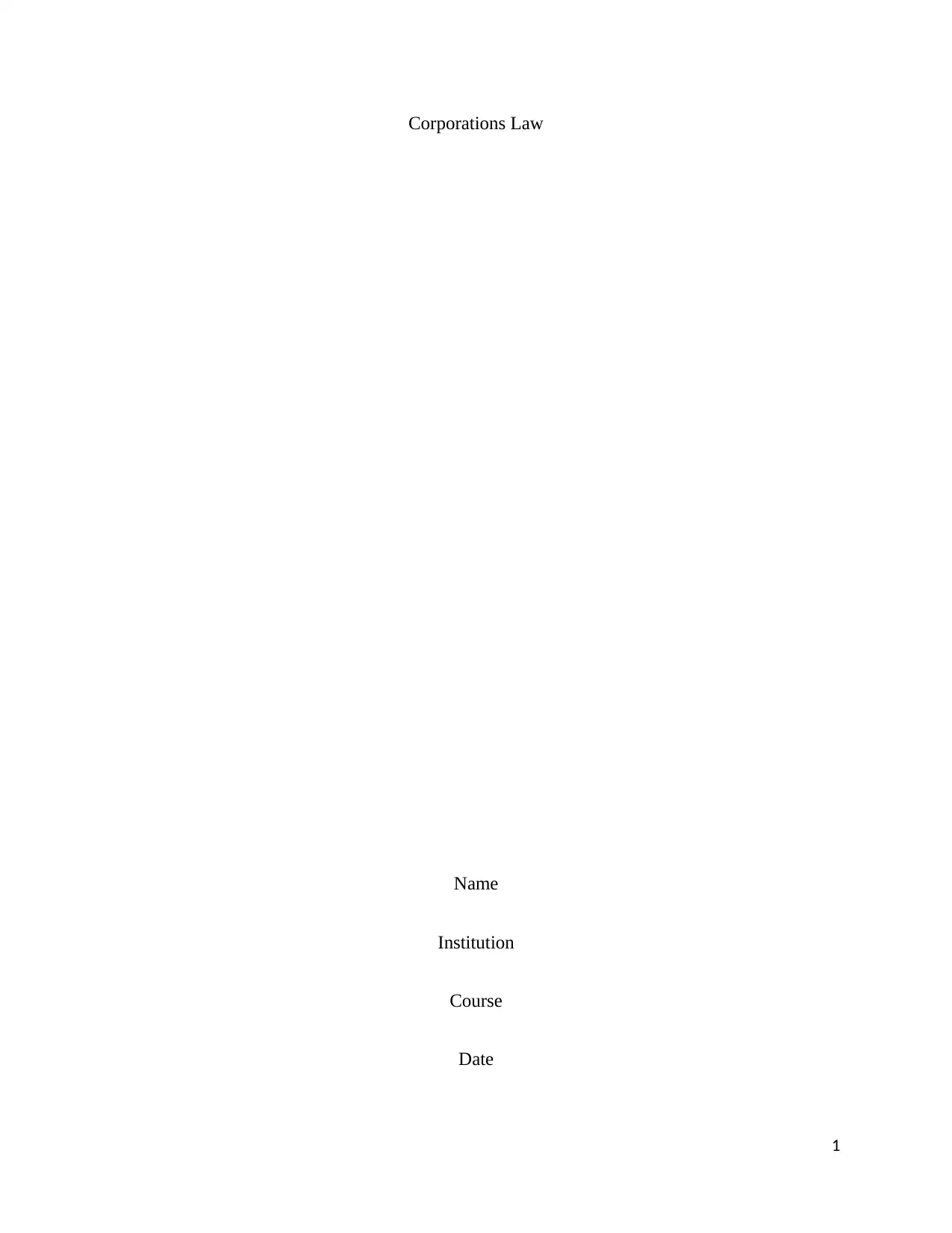
Corporations Law
Name
Institution
Course
Date
1
Name
Institution
Course
Date
1
Paraphrase This Document
Need a fresh take? Get an instant paraphrase of this document with our AI Paraphraser
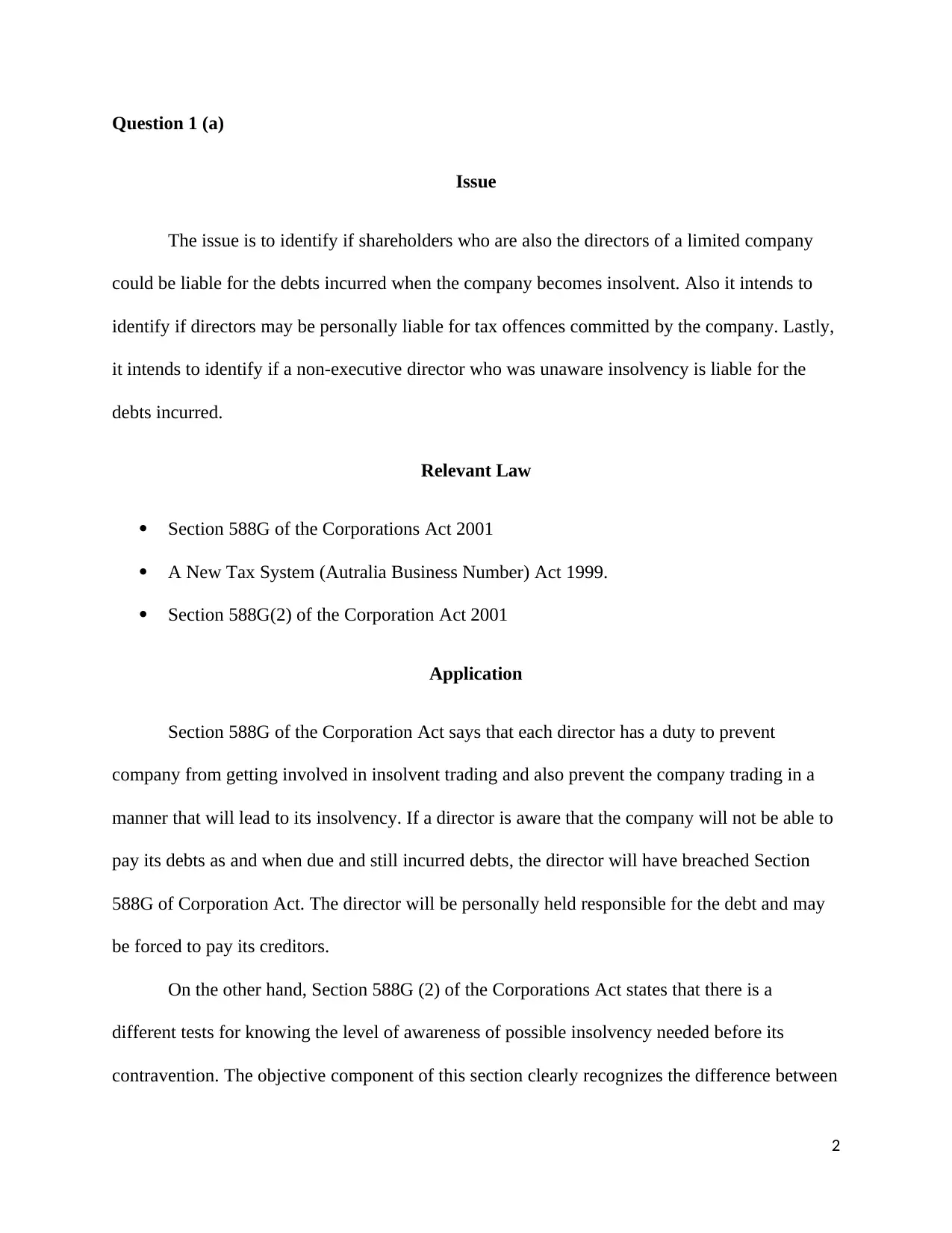
Question 1 (a)
Issue
The issue is to identify if shareholders who are also the directors of a limited company
could be liable for the debts incurred when the company becomes insolvent. Also it intends to
identify if directors may be personally liable for tax offences committed by the company. Lastly,
it intends to identify if a non-executive director who was unaware insolvency is liable for the
debts incurred.
Relevant Law
Section 588G of the Corporations Act 2001
A New Tax System (Autralia Business Number) Act 1999.
Section 588G(2) of the Corporation Act 2001
Application
Section 588G of the Corporation Act says that each director has a duty to prevent
company from getting involved in insolvent trading and also prevent the company trading in a
manner that will lead to its insolvency. If a director is aware that the company will not be able to
pay its debts as and when due and still incurred debts, the director will have breached Section
588G of Corporation Act. The director will be personally held responsible for the debt and may
be forced to pay its creditors.
On the other hand, Section 588G (2) of the Corporations Act states that there is a
different tests for knowing the level of awareness of possible insolvency needed before its
contravention. The objective component of this section clearly recognizes the difference between
2
Issue
The issue is to identify if shareholders who are also the directors of a limited company
could be liable for the debts incurred when the company becomes insolvent. Also it intends to
identify if directors may be personally liable for tax offences committed by the company. Lastly,
it intends to identify if a non-executive director who was unaware insolvency is liable for the
debts incurred.
Relevant Law
Section 588G of the Corporations Act 2001
A New Tax System (Autralia Business Number) Act 1999.
Section 588G(2) of the Corporation Act 2001
Application
Section 588G of the Corporation Act says that each director has a duty to prevent
company from getting involved in insolvent trading and also prevent the company trading in a
manner that will lead to its insolvency. If a director is aware that the company will not be able to
pay its debts as and when due and still incurred debts, the director will have breached Section
588G of Corporation Act. The director will be personally held responsible for the debt and may
be forced to pay its creditors.
On the other hand, Section 588G (2) of the Corporations Act states that there is a
different tests for knowing the level of awareness of possible insolvency needed before its
contravention. The objective component of this section clearly recognizes the difference between
2
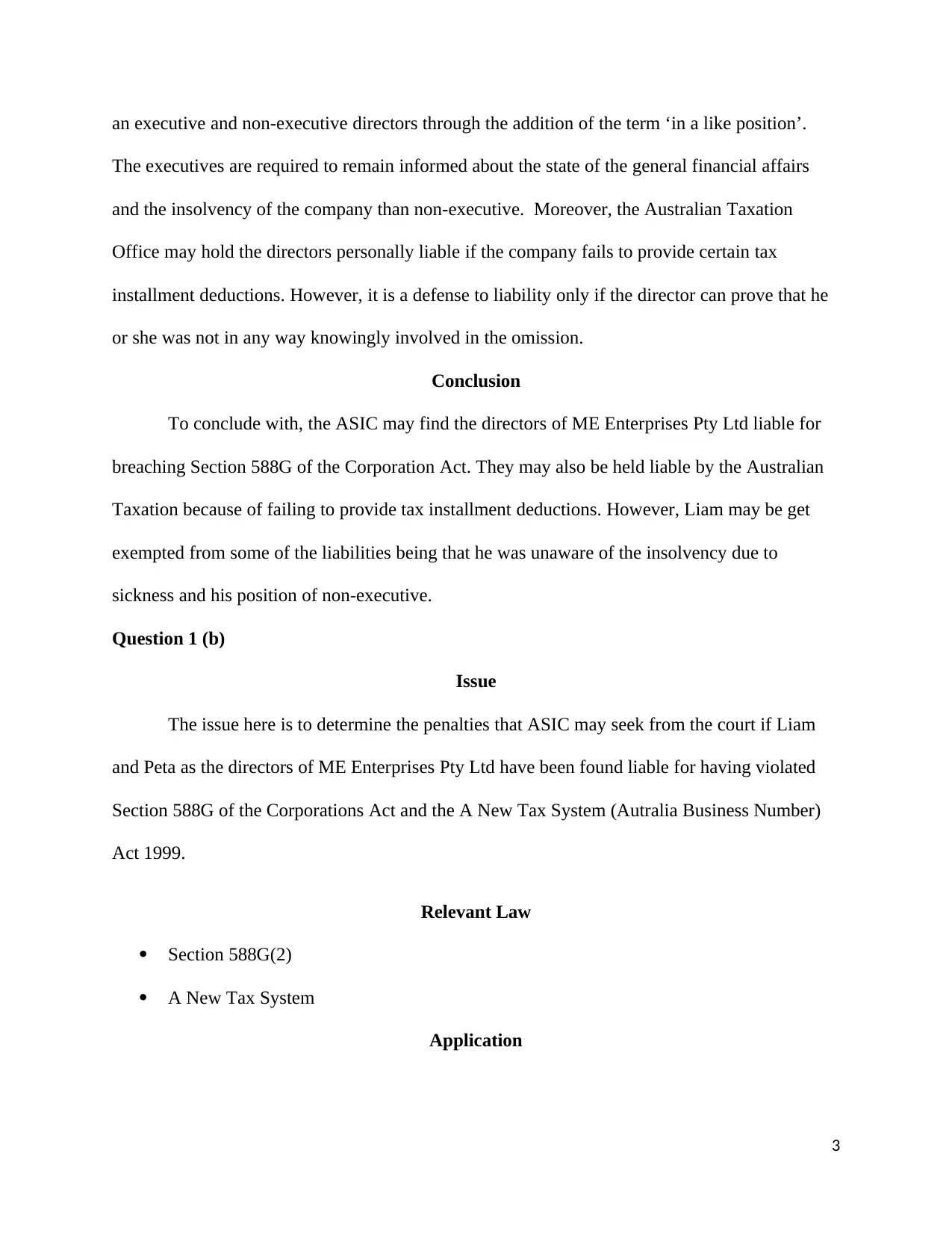
an executive and non-executive directors through the addition of the term ‘in a like position’.
The executives are required to remain informed about the state of the general financial affairs
and the insolvency of the company than non-executive. Moreover, the Australian Taxation
Office may hold the directors personally liable if the company fails to provide certain tax
installment deductions. However, it is a defense to liability only if the director can prove that he
or she was not in any way knowingly involved in the omission.
Conclusion
To conclude with, the ASIC may find the directors of ME Enterprises Pty Ltd liable for
breaching Section 588G of the Corporation Act. They may also be held liable by the Australian
Taxation because of failing to provide tax installment deductions. However, Liam may be get
exempted from some of the liabilities being that he was unaware of the insolvency due to
sickness and his position of non-executive.
Question 1 (b)
Issue
The issue here is to determine the penalties that ASIC may seek from the court if Liam
and Peta as the directors of ME Enterprises Pty Ltd have been found liable for having violated
Section 588G of the Corporations Act and the A New Tax System (Autralia Business Number)
Act 1999.
Relevant Law
Section 588G(2)
A New Tax System
Application
3
The executives are required to remain informed about the state of the general financial affairs
and the insolvency of the company than non-executive. Moreover, the Australian Taxation
Office may hold the directors personally liable if the company fails to provide certain tax
installment deductions. However, it is a defense to liability only if the director can prove that he
or she was not in any way knowingly involved in the omission.
Conclusion
To conclude with, the ASIC may find the directors of ME Enterprises Pty Ltd liable for
breaching Section 588G of the Corporation Act. They may also be held liable by the Australian
Taxation because of failing to provide tax installment deductions. However, Liam may be get
exempted from some of the liabilities being that he was unaware of the insolvency due to
sickness and his position of non-executive.
Question 1 (b)
Issue
The issue here is to determine the penalties that ASIC may seek from the court if Liam
and Peta as the directors of ME Enterprises Pty Ltd have been found liable for having violated
Section 588G of the Corporations Act and the A New Tax System (Autralia Business Number)
Act 1999.
Relevant Law
Section 588G(2)
A New Tax System
Application
3
⊘ This is a preview!⊘
Do you want full access?
Subscribe today to unlock all pages.

Trusted by 1+ million students worldwide
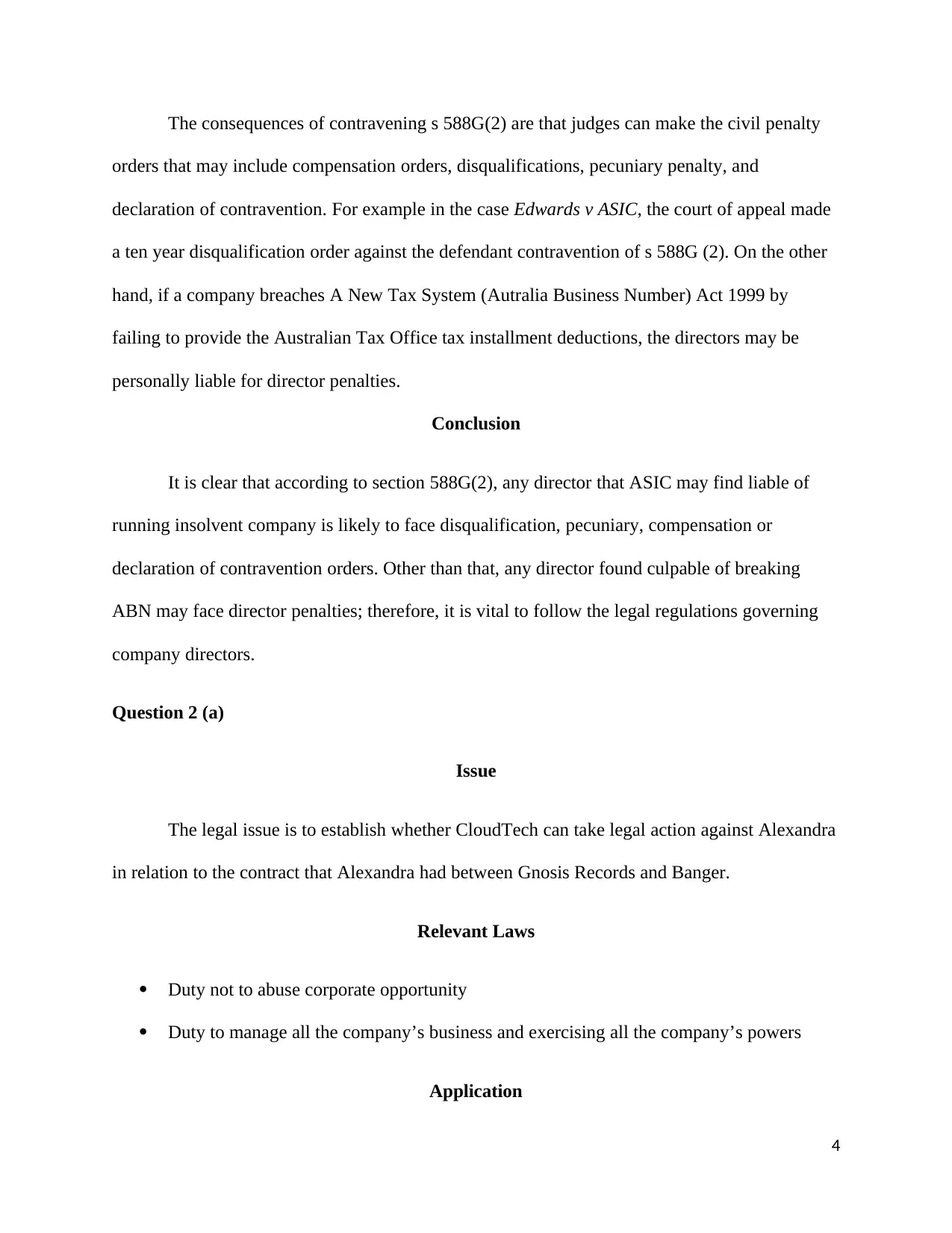
The consequences of contravening s 588G(2) are that judges can make the civil penalty
orders that may include compensation orders, disqualifications, pecuniary penalty, and
declaration of contravention. For example in the case Edwards v ASIC, the court of appeal made
a ten year disqualification order against the defendant contravention of s 588G (2). On the other
hand, if a company breaches A New Tax System (Autralia Business Number) Act 1999 by
failing to provide the Australian Tax Office tax installment deductions, the directors may be
personally liable for director penalties.
Conclusion
It is clear that according to section 588G(2), any director that ASIC may find liable of
running insolvent company is likely to face disqualification, pecuniary, compensation or
declaration of contravention orders. Other than that, any director found culpable of breaking
ABN may face director penalties; therefore, it is vital to follow the legal regulations governing
company directors.
Question 2 (a)
Issue
The legal issue is to establish whether CloudTech can take legal action against Alexandra
in relation to the contract that Alexandra had between Gnosis Records and Banger.
Relevant Laws
Duty not to abuse corporate opportunity
Duty to manage all the company’s business and exercising all the company’s powers
Application
4
orders that may include compensation orders, disqualifications, pecuniary penalty, and
declaration of contravention. For example in the case Edwards v ASIC, the court of appeal made
a ten year disqualification order against the defendant contravention of s 588G (2). On the other
hand, if a company breaches A New Tax System (Autralia Business Number) Act 1999 by
failing to provide the Australian Tax Office tax installment deductions, the directors may be
personally liable for director penalties.
Conclusion
It is clear that according to section 588G(2), any director that ASIC may find liable of
running insolvent company is likely to face disqualification, pecuniary, compensation or
declaration of contravention orders. Other than that, any director found culpable of breaking
ABN may face director penalties; therefore, it is vital to follow the legal regulations governing
company directors.
Question 2 (a)
Issue
The legal issue is to establish whether CloudTech can take legal action against Alexandra
in relation to the contract that Alexandra had between Gnosis Records and Banger.
Relevant Laws
Duty not to abuse corporate opportunity
Duty to manage all the company’s business and exercising all the company’s powers
Application
4
Paraphrase This Document
Need a fresh take? Get an instant paraphrase of this document with our AI Paraphraser
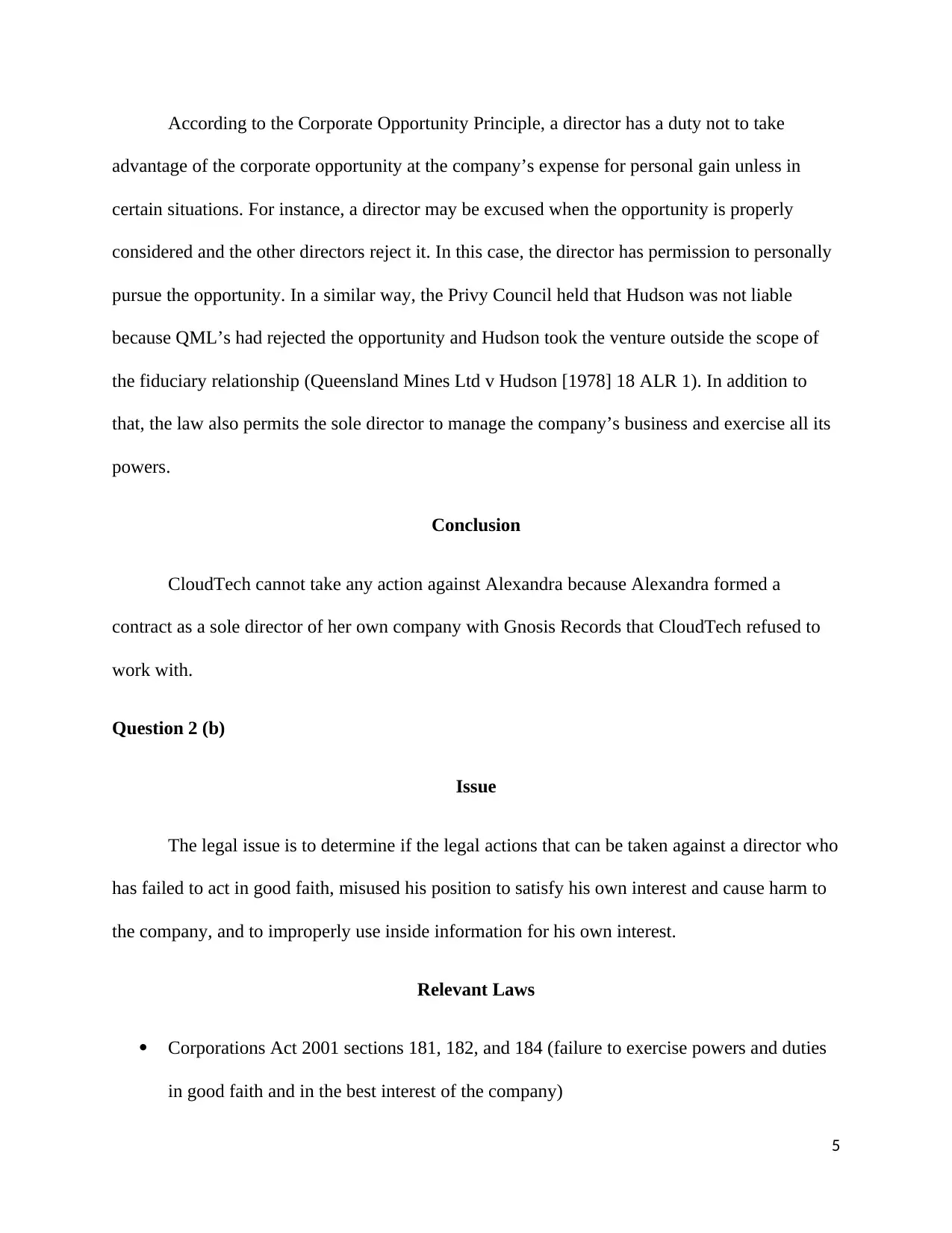
According to the Corporate Opportunity Principle, a director has a duty not to take
advantage of the corporate opportunity at the company’s expense for personal gain unless in
certain situations. For instance, a director may be excused when the opportunity is properly
considered and the other directors reject it. In this case, the director has permission to personally
pursue the opportunity. In a similar way, the Privy Council held that Hudson was not liable
because QML’s had rejected the opportunity and Hudson took the venture outside the scope of
the fiduciary relationship (Queensland Mines Ltd v Hudson [1978] 18 ALR 1). In addition to
that, the law also permits the sole director to manage the company’s business and exercise all its
powers.
Conclusion
CloudTech cannot take any action against Alexandra because Alexandra formed a
contract as a sole director of her own company with Gnosis Records that CloudTech refused to
work with.
Question 2 (b)
Issue
The legal issue is to determine if the legal actions that can be taken against a director who
has failed to act in good faith, misused his position to satisfy his own interest and cause harm to
the company, and to improperly use inside information for his own interest.
Relevant Laws
Corporations Act 2001 sections 181, 182, and 184 (failure to exercise powers and duties
in good faith and in the best interest of the company)
5
advantage of the corporate opportunity at the company’s expense for personal gain unless in
certain situations. For instance, a director may be excused when the opportunity is properly
considered and the other directors reject it. In this case, the director has permission to personally
pursue the opportunity. In a similar way, the Privy Council held that Hudson was not liable
because QML’s had rejected the opportunity and Hudson took the venture outside the scope of
the fiduciary relationship (Queensland Mines Ltd v Hudson [1978] 18 ALR 1). In addition to
that, the law also permits the sole director to manage the company’s business and exercise all its
powers.
Conclusion
CloudTech cannot take any action against Alexandra because Alexandra formed a
contract as a sole director of her own company with Gnosis Records that CloudTech refused to
work with.
Question 2 (b)
Issue
The legal issue is to determine if the legal actions that can be taken against a director who
has failed to act in good faith, misused his position to satisfy his own interest and cause harm to
the company, and to improperly use inside information for his own interest.
Relevant Laws
Corporations Act 2001 sections 181, 182, and 184 (failure to exercise powers and duties
in good faith and in the best interest of the company)
5
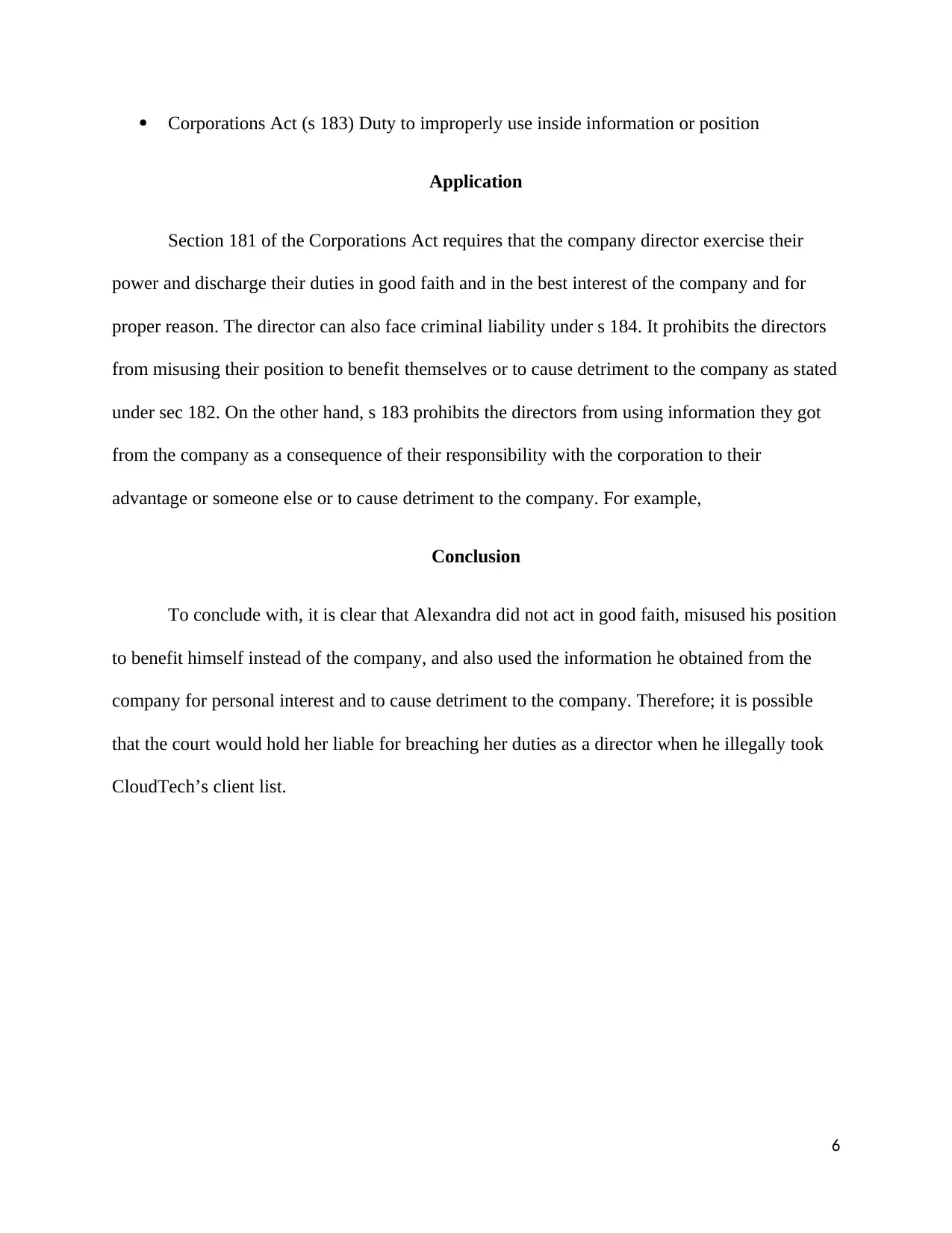
Corporations Act (s 183) Duty to improperly use inside information or position
Application
Section 181 of the Corporations Act requires that the company director exercise their
power and discharge their duties in good faith and in the best interest of the company and for
proper reason. The director can also face criminal liability under s 184. It prohibits the directors
from misusing their position to benefit themselves or to cause detriment to the company as stated
under sec 182. On the other hand, s 183 prohibits the directors from using information they got
from the company as a consequence of their responsibility with the corporation to their
advantage or someone else or to cause detriment to the company. For example,
Conclusion
To conclude with, it is clear that Alexandra did not act in good faith, misused his position
to benefit himself instead of the company, and also used the information he obtained from the
company for personal interest and to cause detriment to the company. Therefore; it is possible
that the court would hold her liable for breaching her duties as a director when he illegally took
CloudTech’s client list.
6
Application
Section 181 of the Corporations Act requires that the company director exercise their
power and discharge their duties in good faith and in the best interest of the company and for
proper reason. The director can also face criminal liability under s 184. It prohibits the directors
from misusing their position to benefit themselves or to cause detriment to the company as stated
under sec 182. On the other hand, s 183 prohibits the directors from using information they got
from the company as a consequence of their responsibility with the corporation to their
advantage or someone else or to cause detriment to the company. For example,
Conclusion
To conclude with, it is clear that Alexandra did not act in good faith, misused his position
to benefit himself instead of the company, and also used the information he obtained from the
company for personal interest and to cause detriment to the company. Therefore; it is possible
that the court would hold her liable for breaching her duties as a director when he illegally took
CloudTech’s client list.
6
⊘ This is a preview!⊘
Do you want full access?
Subscribe today to unlock all pages.

Trusted by 1+ million students worldwide
1 out of 6
Related Documents
Your All-in-One AI-Powered Toolkit for Academic Success.
+13062052269
info@desklib.com
Available 24*7 on WhatsApp / Email
![[object Object]](/_next/static/media/star-bottom.7253800d.svg)
Unlock your academic potential
Copyright © 2020–2026 A2Z Services. All Rights Reserved. Developed and managed by ZUCOL.





